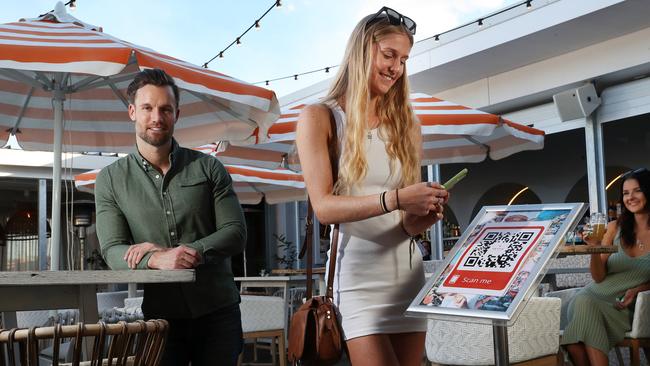Queensland hospitality venues fined almost $35,000 over COVID-safe breaches
Queensland hospitality venues have been smashed with huge fines after failing to keep adequate contact information records, with more eateries under investigation and further fines set to be issued as many venues are unaware they are breaking the law.
QLD Taste
Don't miss out on the headlines from QLD Taste. Followed categories will be added to My News.
Queensland eateries have been hit with almost $35,000 in fines in the past month for failing to comply with new COVID-19 contact information record keeping requirements.
Measures introduced by the Office of Liquor and Gaming Regulation require restaurants, cafes and bars to collect the name of each diner and their phone number, email or residential address and time of patronage, storing it for 56 days. This enables health authorities to undertake accurate contact tracing should a COVID-19 outbreak occur.
Pinkenba Hotel rebranded Trade Coast Hotel after $3m makeover
Honour Ave Cellars in Graceville to open to only 8 patrons
But in the past month, the OLGR has issued six fines to venues for failing to comply with the regulation, with more eateries under investigation and further fines set to be issued.
“As OLGR officers conduct venue inspections, record keeping requirements will continue to be a focus. Venues not taking the appropriate steps to comply risk fines of up to $6672,” said an OLGR spokeswoman.
Some of the breaches are believed to relate to venues which simply keep a sheet of paper and pen permanently at a table only collected at the end of the day. The OLGR said this was unsuitable, as was having any kind of running list that could potentially be tampered with by another patron.
But investigations by The Courier-Mail found these methods were common practice at a number of cafes across southeast Queensland, with many venues unaware they were breaking the law.
“Collecting accurate and complete information is crucial in this process,” said the OLGR spokeswoman. “It is strongly recommended that venues also check IDs when collecting patron details to ensure people are providing correct information.”
But hospitality operators said checking identification posed a potential health threat, could lead to abuse of staff and cost too much time and money.
Kedron’s Farm House cafe operates a QR code system, with patrons using their smart phones to access a registration site, as well as pen and paper for those without a mobile. But owner Amanda Scott said checking IDs was a step too far.

“I would cry if we had to do that because our labour costs are so high at the moment,” she said. “We can’t guarantee (the contact information) it’s the truth, but I guess if the police at the border can’t guarantee it’s the truth, there’s not much hope for me and waitresses and baristas.”
She said the family-owned business had been hit with an onslaught of extra costs from complying with new COVID-19 regulations, such as $250 a week in disposable menus, $15 a month for using the GuestHQ QR code system, and thousands of dollars in extra labour costs, with one staff member employed to simply answer the phone and take bookings, and another for handling check-ins and ensuring all tables and chairs were disinfected between guests.
“The thing is we’re charging cafe prices but we have all these extra people who get paid restaurant awards to do this labour, so it’s really challenging. So if we had to do more I don’t know how we could do more because it’s just so expensive for us,” Mrs Scott said.

Tim Johnson behind hugely popular Queensland restaurants Corbette and Claude, Comuna Cantina and Sichuan Papa said they used QR codes to take people’s details, checked temperatures of diners on arrival and had digital, contactless menus, but said checking IDs would not be popular with diners.
“We’ll do whatever we have to but we’re already pushing the friendship in taking the details that we are,” Mr Johnson said.
“Then to ask for ID it’s sort of breaking down the hospitality experience so I would prefer not to have to.”
City fine diner Otto Brisbane also uses a QR code system to log guests but said they weren’t comfortable checking patron identification as it posed a health risk to staff.
“We do not ID check the guests as handling these items to confirm authenticity is a potential point of contamination,” said an Otto spokeswoman.
“However, our team do ask to see the confirmation screen to confirm the guest has signed in.”
Restaurant and Catering Australia boss Wes Lambert said patrons would simply have to get used to providing their contact details to eateries if they wanted to continue to dine out as it was now a legal requirement.
“It is highly important for the health and safety of everyone and the ability for you as a consumer to continue to go to your favourite businesses that you give the correct information because if there’s an outbreak at a particular business and you were there and gave false information, you won’t know,” Mr Lambert said.

